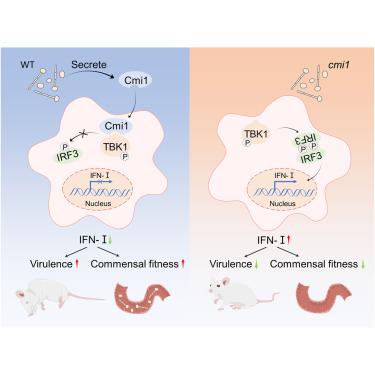当前位置:
X-MOL 学术
›
Cell Host Microbe
›
论文详情
Our official English website, www.x-mol.net, welcomes your
feedback! (Note: you will need to create a separate account there.)
A human commensal-pathogenic fungus suppresses host immunity via targeting TBK1
Cell Host & Microbe ( IF 20.6 ) Pub Date : 2024-07-30 , DOI: 10.1016/j.chom.2024.07.003 Gang Luo 1 , Jingkai Zhang 1 , Tianxu Wang 1 , Hao Cui 1 , Yukun Bai 1 , Jianchen Luo 2 , Jinqiu Zhang 2 , Mao Zhang 3 , Linyan Di 4 , Yuncong Yuan 3 , Kang Xiong 3 , Xiangtai Yu 3 , Yaling Zhang 1 , Chao Shen 3 , Cheng Zhu 4 , Yong Wang 2 , Chang Su 3 , Yang Lu 1
Candida albicans stably colonizes humans but is the leading cause of hospital-acquired fungemia. Traditionally, masking immunogenic moieties has been viewed as a tactic for immune evasion. Here, we demonstrate that C. albicans blocks type I interferon (IFN-I) signaling via translocating an effector protein Cmi1 into host cells. Mechanistically, Cmi1 binds and inhibits TANK-binding kinase 1 (TBK1) to abrogate IFN-regulatory factor 3 (IRF3) phosphorylation, thereby suppressing the IFN-I cascade. Murine infection with a cmi1 mutant displays an exaggerated IFN-I response in both kidneys and bone-marrow-derived macrophages, leading to rapid fungal clearance and host survival. Remarkably, the lack of CMI1 compromises gut commensalism and increases IFN-I response in mouse colonic cells. These phenotypes of cmi1 are rescued by the depletion of IFN-I receptor. This work establishes the importance of TBK1 inhibition in fungal pathogenesis and reveals that a human commensal-pathogenic fungus significantly impacts host immunity during gut colonization and infection via delivering effector proteins into host cells.
中文翻译:

一种人类共生病原真菌通过靶向 TBK1 抑制宿主免疫
白色念珠菌在人类中稳定定植,但却是医院获得性真菌血症的主要原因。传统上,掩盖免疫原性部分被视为免疫逃避的一种策略。在这里,我们证明白色念珠 菌通过将效应蛋白 Cmi1 转位到宿主细胞中来阻断 I 型干扰素 (IFN-I) 信号传导。从机制上讲,Cmi1 结合并抑制 TANK 结合激酶 1 (TBK1) 以消除 IFN 调节因子 3 (IRF3) 磷酸化,从而抑制 IFN-I 级联反应。小鼠感染 cmi1 突变体在肾脏和骨髓来源的巨噬细胞中均表现出夸大的 IFN-I 反应,导致真菌快速清除和宿主存活。值得注意的是,CMI1 的缺乏会损害小鼠结肠细胞中的肠道共生并增加 IFN-I 反应。cmi1 的这些表型通过 IFN-I 受体的耗竭来挽救。这项工作确定了 TBK1 抑制在真菌发病机制中的重要性,并揭示了人类共生病原真菌通过将效应蛋白递送到宿主细胞中,在肠道定植和感染过程中显着影响宿主免疫。
更新日期:2024-07-30
Cell Host & Microbe ( IF 20.6 ) Pub Date : 2024-07-30 , DOI: 10.1016/j.chom.2024.07.003 Gang Luo 1 , Jingkai Zhang 1 , Tianxu Wang 1 , Hao Cui 1 , Yukun Bai 1 , Jianchen Luo 2 , Jinqiu Zhang 2 , Mao Zhang 3 , Linyan Di 4 , Yuncong Yuan 3 , Kang Xiong 3 , Xiangtai Yu 3 , Yaling Zhang 1 , Chao Shen 3 , Cheng Zhu 4 , Yong Wang 2 , Chang Su 3 , Yang Lu 1
Affiliation

|
中文翻译:

一种人类共生病原真菌通过靶向 TBK1 抑制宿主免疫
白色念珠菌在人类中稳定定植,但却是医院获得性真菌血症的主要原因。传统上,掩盖免疫原性部分被视为免疫逃避的一种策略。在这里,我们证明白色念珠 菌通过将效应蛋白 Cmi1 转位到宿主细胞中来阻断 I 型干扰素 (IFN-I) 信号传导。从机制上讲,Cmi1 结合并抑制 TANK 结合激酶 1 (TBK1) 以消除 IFN 调节因子 3 (IRF3) 磷酸化,从而抑制 IFN-I 级联反应。小鼠感染 cmi1 突变体在肾脏和骨髓来源的巨噬细胞中均表现出夸大的 IFN-I 反应,导致真菌快速清除和宿主存活。值得注意的是,CMI1 的缺乏会损害小鼠结肠细胞中的肠道共生并增加 IFN-I 反应。cmi1 的这些表型通过 IFN-I 受体的耗竭来挽救。这项工作确定了 TBK1 抑制在真菌发病机制中的重要性,并揭示了人类共生病原真菌通过将效应蛋白递送到宿主细胞中,在肠道定植和感染过程中显着影响宿主免疫。































 京公网安备 11010802027423号
京公网安备 11010802027423号